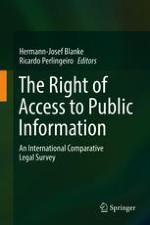2018 | OriginalPaper | Buchkapitel
9. Right of Access to Public Information: The Portuguese Case
verfasst von : Luísa Neto
Erschienen in: The Right of Access to Public Information
Verlag: Springer Berlin Heidelberg
Aktivieren Sie unsere intelligente Suche, um passende Fachinhalte oder Patente zu finden.
Wählen Sie Textabschnitte aus um mit Künstlicher Intelligenz passenden Patente zu finden. powered by
Markieren Sie Textabschnitte, um KI-gestützt weitere passende Inhalte zu finden. powered by
